Prime Minister Hun Sen has touted Cambodia’s “strong” agricultural sector as a solution to economic pressures during the global pandemic, though some observers doubt agriculture could make up for garment sector losses due to Covid-19 and the pending withdrawal of some E.U. trade perks.
In a speech at the Freshwater Aquaculture Research and Development Center in Prey Veng province’s Peam Ro district on Tuesday, Hun Sen said the government was preparing to further support the nation’s already strong agriculture industry.
“Cambodia has a strong point, which we have to remember, that we are an agricultural country,” the premier said. “[Covid-19] is not only not hurting [Cambodia] but it also allows us to dominate in the agricultural sector. That is why the government has quickly changed direction to push for [financial support in] the agricultural sector at large.”
The government has recorded 165 cases of Covid-19 since January and reported no deaths linked to coronavirus.
Hun Sen said Cambodians would not starve amid the Covid-19 pandemic because the national economy was not solely reliant on the garment and tourism sectors, which have been heavily affected by global travel restrictions and slumping consumer demand.
However, a World Bank update from May said that the agriculture sector is “unlikely to be able to substantially absorb laid-off workers from the tourism and export sectors” due to its “weak performance.”
The premier also announced that the government would boost aquaculture production, and said that the Rural Development Bank received $500,000 in government funds to support the industry, which would be increased if necessary. Last month, Hun Sen said the government would also invest $100 million in rural irrigation projects to support agriculture and provide short-term work in the provinces.
Hun Sen’s announcement comes ahead of the signing of the Cambodia-China Free Trade Agreement next month, which officials have said would focus on agricultural trade, Voice of America reported last week.
Agriculture’s contribution to GDP growth decreased last year for the first time since 2004, the World Bank said in its May report. The sector was also largely ignored in foreign direct investment (FDI) projects approved by the government last year: Agriculture made up just 1 percent of approved FDI projects by value, while the real estate sector in contrast absorbed 51 percent of approved FDI projects, according to the World Bank.
Yang Saing Koma, an agronomist and the board chair of the Grassroots Democracy Party, agreed that there was rich potential in Cambodia’s agricultural sector because of the country’s natural resources. However, the nation had become reliant on agricultural imports from neighboring countries like Vietnam and Thailand, which has cost Cambodia revenue and domestic jobs.
“So far, we have seen [the premier] speak more than act,” Saing Koma said. “Why do I say that? Because in the villages, communes, districts, there are almost no agricultural officials directly visiting the people. [Officials] said farmers lack resources, have insufficient salaries, lack of means of transportation…But there is no clear policy [to change that].”
Moeun Tola, executive director of labor rights group Central, said the government’s decision to invest in agriculture and reduce imports was a positive move.
But the labor advocate worried that officials would focus on agriculture to address the partial loss of Cambodia’s “Everything But Arms” (EBA) duty-free trade access to the E.U. and forget to address the human rights and labor rights concerns raised in the European Commission’s decision to withdraw some trade benefits.
“Cambodia should try to keep EBA [and keep] from losing [duty-free access on] another 20 percent [of exports], because we have already lost the agricultural sector and they now require us to pay import taxes [on rice],” Tola said, referring to the E.U.’s decision last year to impose tariffs on Cambodian rice.
“There are other remaining agro-industrial products, and if we lose them, we will have a problem,” Tola added.
The World Bank projected in May that Cambodia’s GDP growth will contract for the first time since 1994 due to the global economic shock of Covid-19. The nation’s core economic drivers — the garment sector, tourism, and real estate and construction — are highly-globalized industries, all of which have been hit hard by the pandemic-driven slowdown.
In recent weeks, industry groups have appealed to E.U. lawmakers to delay the partial withdrawal of EBA benefits, which is scheduled to go into effect on August 12. The Garment Manufacturers Association in Cambodia said more than 400 factories have suspended operations due to the sharp decrease in global demand for garments, impacting more than 150,000 workers.
(Translated and edited from the original article on VOD Khmer)













